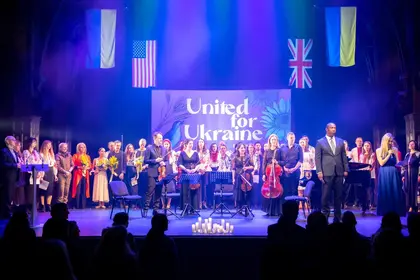On the evening of Feb. 20, the historic Palace Theatre in London became the focal point of a remarkable gathering titled “United for Ukraine.” This event, conceived and organized by the US embassy and meticulously managed by the Embassy of Ukraine in the UK, stood as a vibrant testament to the enduring spirit of Ukrainian culture and the international solidarity that supports it. In these trying times, when Ukraine faces unprecedented challenges, such events are not just cultural showcases but powerful symbols of unity and resilience.
The choice of the Palace Theatre, nestled in the heart of London, was no mere coincidence. It provided not just a central location but a cultural canvas that perfectly echoed the event’s core message: a focus on culture over politics during a period that demands remembrance and a united front in support of Ukraine’s struggle against Russian aggression. The event was a celebration of Ukrainian heritage, an affirmation of its rich cultural landscape, and a reminder of the unwavering support from the international community.
JOIN US ON TELEGRAM
Follow our coverage of the war on the @Kyivpost_official.
Featuring performances by Svyatoslav Vakarchuk, among others, the evening was a tour de force of Ukrainian culture. Vakarchuk, a towering figure in Ukrainian music and public life, lent his voice and presence, symbolizing the resilience and undying hope of the Ukrainian people. His performance, along with others, wove a tapestry of Ukrainian artistic expression that resonated deeply with the audience, comprising individuals from various walks of life who share a common support for Ukraine’s cause.

Russia Claims Capture of Two More East Ukraine Villages
Amid the cultural showcase, a pivotal moment came when the US ambassador to the UK, Jane Hartley, took the stage. Her speech, punctuated with quotes from President Biden, was not just a message of solidarity but a reaffirmation of the US’s unwavering commitment to stand by Ukraine. She outlined the extensive assistance already provided to Ukraine, highlighting a significant aid package that had garnered bipartisan support in the Senate and was awaiting confirmation from Congress. This gesture underscored not just the diplomatic stance of the US but also the tangible measures being taken to support Ukraine in its hour of need.
A conspicuous absence at the event was the opportunity for fundraising. The lack of a mechanism for donations at such a high-profile gathering raises questions.
The “United for Ukraine” event transcends its immediate cultural presentation. Through cultural diplomacy, it reinforces the message that the struggle of Ukraine is not isolated; it is a global concern that calls for a unified stance against aggression and towards peace. It stands as a testament to the resilience of the human spirit, the unbreakable bond of international alliances, and the enduring hope for a peaceful future.
However, as the cultural performances of the evening unfolded, a critical reflection on the broader geopolitical context revealed underlying tensions and complexities. Despite the outward display of solidarity, the unity within the US regarding support for Ukraine is not as unequivocal as it appears. The legislative process for the aid package to Ukraine is fraught with uncertainty. The potential for Congress to reject the bill underscores a significant divide within American politics, exacerbated by the polarizing figure of former President Donald Trump. His influence, perceived by many as detrimental to Ukraine’s defense efforts, highlights the precarious nature of international support in the face of political division.
A conspicuous absence at the event was the opportunity for fundraising. In a world where countless individuals and millions of Ukrainians contribute regularly to their country’s defense, the lack of a mechanism for donations at such a high-profile gathering raises questions. The event could have served as a powerful platform for mobilizing additional financial support for Ukraine and the millions of displaced Ukrainians, yet this opportunity was missed. This oversight suggests a disconnect between the symbolic gestures of solidarity and the practical measures that can significantly impact Ukraine’s ability to sustain its defense efforts.
The American strategy of support, primarily through the provision of military equipment previously stored in US warehouses, also comes under scrutiny. The financing of these aid packages often leads to the replenishment of American military inventories with new equipment, a fact that sits uncomfortably with the narrative of fiscal conservatism championed by some US politicians. The expenditure on such events, while significant, prompts a critical examination of priorities. Could the resources allocated for the evening have been better spent directly supporting Ukraine’s military needs?
Additionally, the mention of Alexei Navalny by the US ambassador, while highlighting the struggle for democracy in Russia, strikes a discordant note. Navalny’s ambiguous position on Crimea has left some questioning his potential as a unifying figure for democratic aspirations. On a day marked by many tragedies – just one of which was the death of a family of five in a strike on the Sumy region – the choice to highlight Navalny’s plight seemed misplaced. It underscored the complex web of narratives and interests that shape the international response to Ukraine’s situation.
This juxtaposition of cultural solidarity with the harsh realities of geopolitical strife and internal political divisions within the US underscores the multifaceted nature of support for Ukraine. The “United for Ukraine” event, while a significant gesture of solidarity, also serves as a reminder of the ongoing challenges in garnering unified and effective support for Ukraine.
As the country continues to navigate its defense against aggression, the international community must critically assess the effectiveness and sincerity of its support mechanisms, ensuring that gestures of solidarity translate into concrete actions that address the urgent needs of the Ukrainian people.
You can also highlight the text and press Ctrl + Enter






